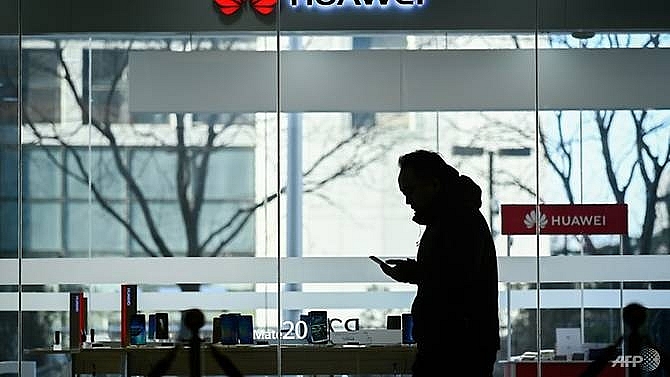Poland 'must pay' for Huawei arrest: Chinese state-run daily
 |
| Last week's detention of Wang Weijing follows the December arrest of Huawei's CFO in Canada AFP/WANG ZHAO |
Last week's detention of Wang Weijing follows the December arrest of Huawei's chief financial officer in Canada, and US efforts to blacklist the company internationally over security concerns.
"Beijing should resolutely negotiate with Warsaw and conduct relative counter-measures, helping the world understand that Poland is an accomplice of the US," the nationalist Global Times said in a strongly worded editorial.
If Huawei suffers a blow, it will affect the confidence of "Chinese society" and the world would think it "doable to bully Chinese enterprises," said the newspaper, which is run by Communist party mouthpiece People's Daily.
"China must not be soft at this point. Beijing will not bully Warsaw - and it is unworthy to do so - but the latter must pay for the offense," the editorial said.
The newspaper did not say what kind of measures China should take.
Days after Canada arrested Huawei CFO Meng Wanzhou on a US extradition request in December, Chinese authorities detained two Canadians - a former diplomat and a businessman - on suspicion of endangering national security, a move seen by observers as an act of retaliation.
Meng is accused of fraud in connection with violations of Iran sanctions.
While China voiced concerns about Wang's arrest in Poland, Huawei has sought to distance itself from the case as it fired the employee, saying his "alleged actions have no relation to the company".
A Polish man was also arrested for alleged espionage along with Wang on Tuesday.
Both men are suspected of having "worked for Chinese services and to the detriment of Poland," said Polish special services spokesman Stanislaw Zaryn.
What the stars mean:
★ Poor ★ ★ Promising ★★★ Good ★★★★ Very good ★★★★★ Exceptional
Related Contents
Latest News
More News
- Russian President congratulates Vietnamese Party leader during phone talks (January 25, 2026 | 09:58)
- Worldwide congratulations underscore confidence in Vietnam’s 14th Party Congress (January 23, 2026 | 09:02)
- Political parties, organisations, int’l friends send congratulations to 14th National Party Congress (January 22, 2026 | 09:33)
- 14th National Party Congress: Japanese media highlight Vietnam’s growth targets (January 21, 2026 | 09:46)
- 14th National Party Congress: Driving force for Vietnam to continue renewal, innovation, breakthroughs (January 21, 2026 | 09:42)
- Vietnam remains spiritual support for progressive forces: Colombian party leader (January 21, 2026 | 08:00)
- Int'l media provides large coverage of 14th National Party Congress's first working day (January 20, 2026 | 09:09)
- Vietnamese firms win top honours at ASEAN Digital Awards (January 16, 2026 | 16:45)
- ASEAN Digital Ministers' Meeting opens in Hanoi (January 15, 2026 | 15:33)
- ASEAN economies move up the global chip value chain (December 09, 2025 | 13:32)

 Tag:
Tag:




















 Mobile Version
Mobile Version